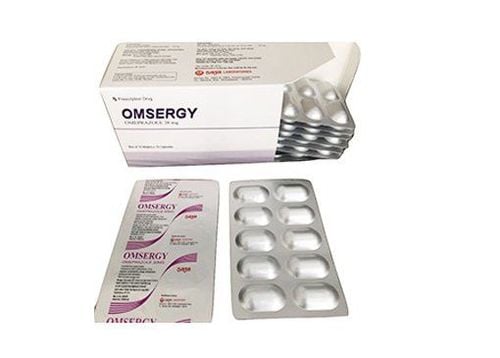This is an automatically translated article.
Mezagastro is used to treat stomach and intestinal ulcers, preventing them from recurring after they have healed. This medication is also used to treat certain stomach and throat (esophagus) problems.
1. What is Mezagastro?
Mezagastro contains the ingredient Nizatidine, which belongs to a group of drugs that reduce the amount of acid produced by cells in the stomach lining. These are known as histamine H2 receptor antagonists but are more commonly known as H2 blockers.
Mezagastro may be helpful in treating conditions caused by too much acid being produced in the stomach. These conditions include stomach ulcers, ulcers in the upper part of the intestines (duodenal ulcers), and acid reflux or heartburn (gastroesophageal reflux disease). Mezagastro may also be prescribed to treat stomach ulcers caused by nonsteroidal anti-inflammatory drugs (NSAIDs). While nizatidine can be helpful in treating these conditions, in practice other drugs are often tried first.
Excessive amounts of acid can cause irritation of the stomach lining, inflammation, ulcers and other conditions. Mezagastro works to reduce the amount of acid in the stomach. This helps relieve symptoms and aids in the healing process once damage has already occurred.
2. What should I pay attention to before using Mezagastro?
To make sure this is the right treatment, before you start taking Mezagastro you need to tell your doctor:
If you are pregnant and breast-feeding; If you have any of the following symptoms: difficulty swallowing, blood loss, weight loss, or if you are sick; If you have any problems with the way your liver works or with the way your kidneys work; If you have had a drug allergy a number of times. 3. Uses of the drug Mezagastro To treat diseases after reducing gastric acid such as:
Duodenal ulcer; Benign gastric ulcer; Prevention of recurrence of duodenal ulcer or benign gastric ulcer; Gastroesophageal reflux disease (including erosions, ulcers, and associated heartburn); Gastric or duodenal ulcers associated with the concomitant use of nonsteroidal anti-inflammatory drugs.
4. How to use Mezagastro
Before you start treatment, read the manufacturer's printed information leaflet from the inside of the package. It will give you more information about Mezagastro and a full list of side effects you may experience while taking it.
Take Mezagastro exactly as your doctor tells you to. There are 2 different strengths of Mezagastro 150mg and 300mg capsules. You may be prescribed Mezagastro to take 2 times a day, in the morning and evening, or just 1 time a day in the evening.
You can take Mezagastro before or after a meal. If you forget to take a dose, you can take it when you remember. If it is almost time for your next dose, skip the missed dose.
5. Undesirable effects
In large-scale clinical trials, sweating and urticaria were significantly more common in patients treated with Mezagastro when compared with placebo.
In similar trials, patients treated with both Mezagastro and placebo had mild, transient, asymptomatic elevations in transaminases or alkaline phosphatase; Rare cases of marked elevation (>500 iu/l) have occurred in patients treated with Mezagastro. However, the overall incidence of elevated liver enzymes, and elevations to 3 times the upper limit of normal, did not differ significantly from placebo. Rare cases of cholestatic or mixed hepatocellular and hepatocellular injury with jaundice have also been reported, with reversal of abnormalities following drug discontinuation.
The following effects have also been reported rarely, thrombocytopenic purpura, fatal thrombocytopenia, leukopenia, agranulocytosis, anemia, exfoliative dermatitis, vasculitis, arthralgia, pain muscle, gynecomastia, impotence, hyperuricemia, fever, nausea and reversible psychosis.
Rare cases of hypersensitivity reactions (eg, bronchospasm, laryngeal edema, rash, pruritus, and eosinophilia), serum sickness, and anaphylaxis have been reported.
6. Advantages and disadvantages of the drug Mezagastro
6.1. Advantages of the drug Mezagastro
Can be taken once or twice a day; Oral solutions are available for people who have difficulty swallowing pills; Available as generic, could be more affordable.
6.2. Disadvantages of the drug Mezagastro
Not as strong as other acid-reducing medications such as proton pump inhibitors (PPIs) such as omeprazole (Prilosec); Dosage reduction is required for people with kidney problems; Not studied for long-term use (more than 3 months); Reduces stomach acid, so it can change how other medicines are absorbed into your body. 7. Factors that affect Mezagastro Before taking any medicine, be sure to tell your doctor about any medical conditions or allergies you may have, the medications you take. usage and any other important information about your health. Women should mention if they are pregnant or breastfeeding. The following factors may affect how you should use Mezagastro :
Liver function : Mezagastro is partially broken down in the liver, how your medical condition may affect the dosage and the effectiveness of this medication and whether monitoring of any particular medication is needed. Renal function: Mezagastro is eliminated by the kidneys. If you have decreased kidney function, how your medical condition may affect the dosing and effectiveness of this medicine and whether any particular medicines need to be monitored. Severe stomach problems: in case of repeated vomiting, trouble swallowing, blood in the stools, significant unintentional weight loss, fatigue (anemia) or coughing up blood, contact your doctor. doctor immediately. Vitamin B12: Long-term use of Mezagastro can cause vitamin B12 deficiency. If you're vegetarian or if your vitamin B12 levels are low, ask your doctor if specific monitoring is necessary. Pregnancy: This medicine should not be used during pregnancy unless the benefits outweigh the risks. If you become pregnant while using this medicine, contact your doctor right away. Nursing mothers: If you use Mezagastro while breastfeeding, your baby may feel the effects. Consult your doctor to see if you should continue breastfeeding. Children: The safety and effectiveness of this drug in children have not been established. In summary, Mezagastro is used to treat ulcers of the stomach and intestines, preventing them from returning after they have healed. You should use the drug exactly as prescribed by your doctor to ensure safety and promote treatment effectiveness.
Please dial HOTLINE for more information or register for an appointment HERE. Download MyVinmec app to make appointments faster and to manage your bookings easily.













